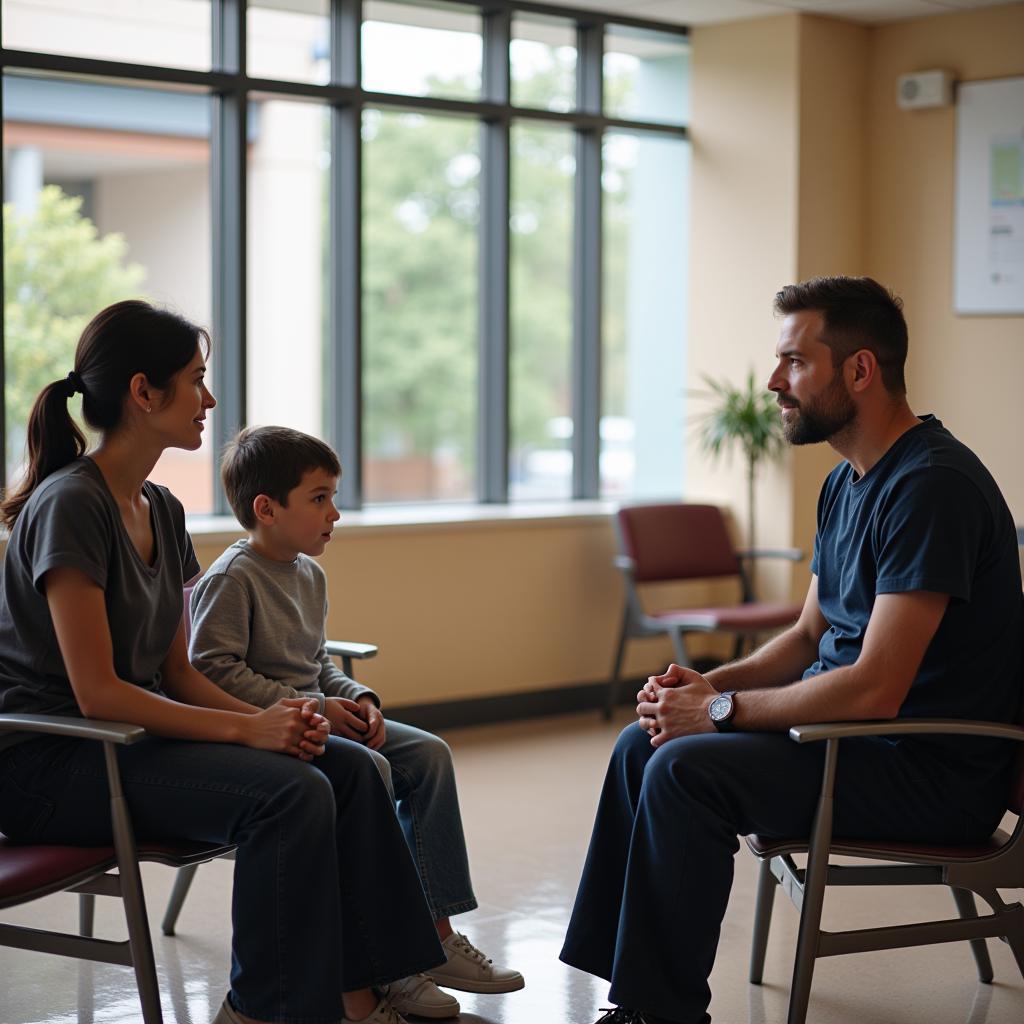Chaplains In Hospitals play a vital role in providing spiritual and emotional care to patients, families, and staff. They offer a compassionate presence during times of crisis, illness, and loss, regardless of a person’s religious beliefs or background. Beyond religious guidance, chaplains offer a listening ear, a supportive presence, and a source of comfort within the often-complex hospital environment.
As part of the interdisciplinary healthcare team, chaplains address the spiritual and emotional dimensions of healing. They actively listen to patients’ fears and anxieties, offering solace and support. They help patients explore their beliefs and values as they navigate challenging medical decisions. Sometimes, simply having someone acknowledge their suffering and provide a non-judgmental space can make a world of difference. Beyond individual patient care, chaplains frequently facilitate communication between patients, families, and medical staff, helping to bridge understanding during stressful periods. They offer bereavement support to families coping with loss and help staff members process the emotional toll of working in a hospital setting.
What Do Chaplains Do? Understanding Their Role in Hospitals
The role of chaplains in hospitals extends far beyond leading prayers. They provide a holistic approach to care, recognizing the interconnectedness of mind, body, and spirit. Chaplains are trained to offer spiritual and emotional support that complements medical treatments, promoting overall well-being. They are equipped to handle a wide range of situations, from helping patients cope with a new diagnosis to supporting families through end-of-life care. Learn more about what chaplains do in hospital.
Addressing Spiritual Needs Within Healthcare
Often, patients facing serious illness grapple with profound existential questions. Chaplains provide a safe space to explore these concerns, offering guidance and support based on the patient’s individual beliefs. This support can be particularly important for those who don’t have a strong connection to a specific religious community or who are questioning their faith in the face of illness. The chaplain’s presence can help patients find meaning and purpose amidst their challenges.
“Spiritual care isn’t just about religion,” explains Dr. Maria Reyes, Director of Spiritual Care at San Jose Hospital. “It’s about helping patients find inner peace and resilience, connecting with their values, and navigating the emotional and spiritual aspects of their health journey.” They can offer support through prayer, meditation, or simply through attentive listening and compassionate presence.
The Importance of Chaplains for Patients and Families
The benefits of chaplaincy services extend beyond the patient. Family members often experience stress and anxiety when a loved one is hospitalized. Chaplains offer them emotional support, helping them cope with the challenges of illness and offering guidance in difficult decision-making processes. They can also facilitate communication between family members and the medical team, ensuring that everyone is informed and supported. Check out this resource for hospice general inpatient care fact sheet for hospitals.
 Chaplain supporting a family in a hospital waiting area
Chaplain supporting a family in a hospital waiting area
Providing Comfort During Times of Grief and Loss
When a patient passes away, the chaplain provides bereavement support to the family, helping them navigate the grieving process. This includes offering emotional support, facilitating memorial services, and connecting families with additional resources. The chaplain’s presence can be a source of comfort and strength during an incredibly difficult time. They strive to create a sense of peace and closure for families who are coping with loss. It is important to consider best hospitals in the philippines when researching chaplain services.
Beyond the Individual: Chaplains and the Hospital Community
Chaplains also play a crucial role in supporting hospital staff. Healthcare professionals often face immense emotional challenges, including burnout and compassion fatigue. Chaplains provide a confidential space for staff members to process their experiences, offering emotional and spiritual support to help them navigate the demanding nature of their work.
Building Bridges of Understanding
“Chaplains act as a bridge between patients, families, and the medical team,” says Reverend John Smith, a chaplain with over 20 years of experience. “We help facilitate communication and understanding, fostering a sense of community and support within the hospital.” Do you know do all hospitals have chapels? You might be surprised. They help create a more compassionate and humane environment for everyone. They often advocate for the needs of patients and families, ensuring that their voices are heard and their concerns are addressed.
Having a chaplain present can ease communication between doctors and patients, especially when delivering difficult news or making complex medical decisions. The chaplain can help clarify information, address emotional concerns, and ensure that patients and families feel heard and understood. It’s worthwhile to look into resources like american hospitals healing a broken system.
 Chaplain leading a group support session in a hospital setting
Chaplain leading a group support session in a hospital setting
In conclusion, chaplains in hospitals provide invaluable support to patients, families, and staff, addressing the spiritual and emotional dimensions of healing. They offer comfort, guidance, and a compassionate presence during times of challenge and uncertainty, fostering a more humane and supportive environment for everyone within the hospital community.
When you or a loved one are in need of spiritual and emotional support during a hospital stay, don’t hesitate to reach out to the chaplaincy services. They are there to provide comfort and guidance on your healing journey.
Contact us for support: Phone Number: 02437655121, Email: [email protected] Or visit us at: No. 298 Cau Dien Street, Minh Khai, Bac Tu Liem, Hanoi, Vietnam. We have a 24/7 customer care team.